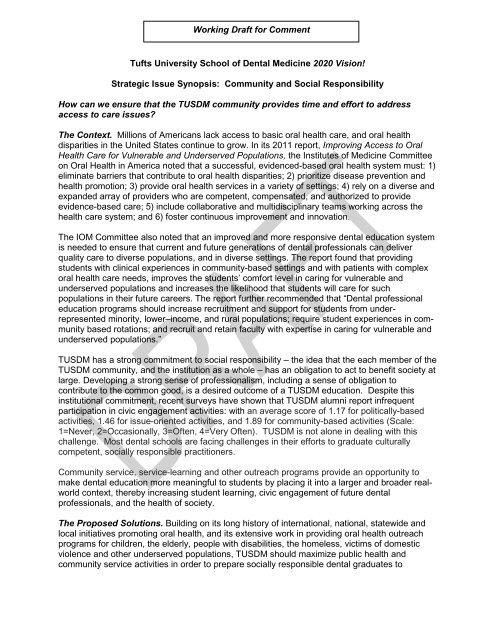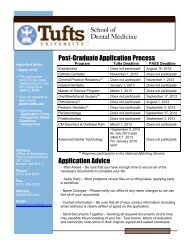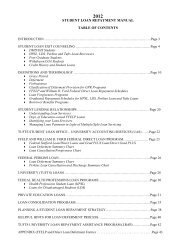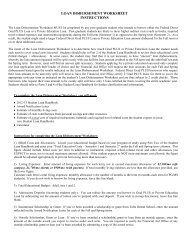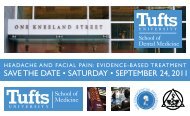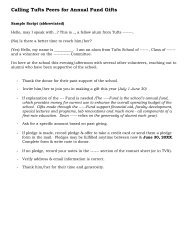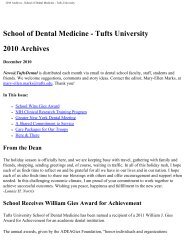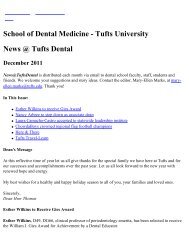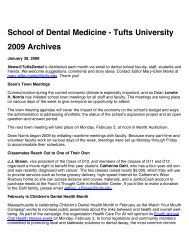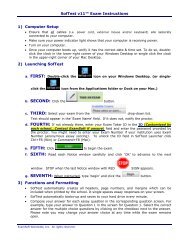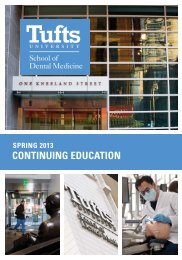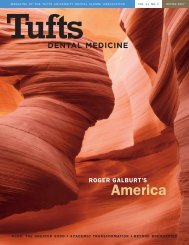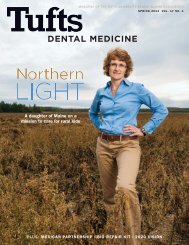Community and Social Responsibility - Tufts University School of ...
Community and Social Responsibility - Tufts University School of ...
Community and Social Responsibility - Tufts University School of ...
You also want an ePaper? Increase the reach of your titles
YUMPU automatically turns print PDFs into web optimized ePapers that Google loves.
Working Draft for Comment<br />
<strong>Tufts</strong> <strong>University</strong> <strong>School</strong> <strong>of</strong> Dental Medicine 2020 Vision!<br />
Strategic Issue Synopsis: <strong>Community</strong> <strong>and</strong> <strong>Social</strong> <strong>Responsibility</strong><br />
How can we ensure that the TUSDM community provides time <strong>and</strong> effort to address<br />
access to care issues<br />
The Context. Millions <strong>of</strong> Americans lack access to basic oral health care, <strong>and</strong> oral health<br />
disparities in the United States continue to grow. In its 2011 report, Improving Access to Oral<br />
Health Care for Vulnerable <strong>and</strong> Underserved Populations, the Institutes <strong>of</strong> Medicine Committee<br />
on Oral Health in America noted that a successful, evidenced-based oral health system must: 1)<br />
eliminate barriers that contribute to oral health disparities; 2) prioritize disease prevention <strong>and</strong><br />
health promotion; 3) provide oral health services in a variety <strong>of</strong> settings; 4) rely on a diverse <strong>and</strong><br />
exp<strong>and</strong>ed array <strong>of</strong> providers who are competent, compensated, <strong>and</strong> authorized to provide<br />
evidence-based care; 5) include collaborative <strong>and</strong> multidisciplinary teams working across the<br />
health care system; <strong>and</strong> 6) foster continuous improvement <strong>and</strong> innovation.<br />
The IOM Committee also noted that an improved <strong>and</strong> more responsive dental education system<br />
is needed to ensure that current <strong>and</strong> future generations <strong>of</strong> dental pr<strong>of</strong>essionals can deliver<br />
quality care to diverse populations, <strong>and</strong> in diverse settings. The report found that providing<br />
students with clinical experiences in community-based settings <strong>and</strong> with patients with complex<br />
oral health care needs, improves the students’ comfort level in caring for vulnerable <strong>and</strong><br />
underserved populations <strong>and</strong> increases the likelihood that students will care for such<br />
populations in their future careers. The report further recommended that “Dental pr<strong>of</strong>essional<br />
education programs should increase recruitment <strong>and</strong> support for students from underrepresented<br />
minority, lower–income, <strong>and</strong> rural populations; require student experiences in community<br />
based rotations; <strong>and</strong> recruit <strong>and</strong> retain faculty with expertise in caring for vulnerable <strong>and</strong><br />
underserved populations.”<br />
TUSDM has a strong commitment to social responsibility – the idea that the each member <strong>of</strong> the<br />
TUSDM community, <strong>and</strong> the institution as a whole – has an obligation to act to benefit society at<br />
large. Developing a strong sense <strong>of</strong> pr<strong>of</strong>essionalism, including a sense <strong>of</strong> obligation to<br />
contribute to the common good, is a desired outcome <strong>of</strong> a TUSDM education. Despite this<br />
institutional commitment, recent surveys have shown that TUSDM alumni report infrequent<br />
participation in civic engagement activities: with an average score <strong>of</strong> 1.17 for politically-based<br />
activities, 1.46 for issue-oriented activities, <strong>and</strong> 1.89 for community-based activities (Scale:<br />
1=Never, 2=Occasionally, 3=Often, 4=Very Often). TUSDM is not alone in dealing with this<br />
challenge. Most dental schools are facing challenges in their efforts to graduate culturally<br />
competent, socially responsible practitioners.<br />
<strong>Community</strong> service, service-learning <strong>and</strong> other outreach programs provide an opportunity to<br />
make dental education more meaningful to students by placing it into a larger <strong>and</strong> broader realworld<br />
context, thereby increasing student learning, civic engagement <strong>of</strong> future dental<br />
pr<strong>of</strong>essionals, <strong>and</strong> the health <strong>of</strong> society.<br />
The Proposed Solutions. Building on its long history <strong>of</strong> international, national, statewide <strong>and</strong><br />
local initiatives promoting oral health, <strong>and</strong> its extensive work in providing oral health outreach<br />
programs for children, the elderly, people with disabilities, the homeless, victims <strong>of</strong> domestic<br />
violence <strong>and</strong> other underserved populations, TUSDM should maximize public health <strong>and</strong><br />
community service activities in order to prepare socially responsible dental graduates to
Strategic Issue Synopsis: <strong>Community</strong> <strong>and</strong> <strong>Social</strong> <strong>Responsibility</strong> Page 2<br />
Working Draft for Comment September 4, 2012<br />
recognize <strong>and</strong> approach oral health care issues for populations with variety <strong>of</strong> social, economic,<br />
medical, <strong>and</strong> dental pr<strong>of</strong>iles <strong>and</strong> resources.<br />
<strong>Community</strong> Service Learning combines learning initiatives <strong>and</strong> service outcomes, which<br />
complement one another to enhance the development <strong>of</strong> the community partnership. The<br />
model uses meaningful community service along with instruction <strong>and</strong> reflection to teach<br />
students civic responsibility, identify their future role as a dentist in their local community, <strong>and</strong><br />
actively engage in development <strong>and</strong> sustainability <strong>of</strong> the partnerships between TUSDM <strong>and</strong><br />
community. Outreach programs <strong>and</strong> service-learning opportunities can help to inculcate in<br />
students the sense <strong>of</strong> ethics <strong>and</strong> pr<strong>of</strong>essionalism needed by socially responsible practitioners.<br />
For those students who already have humanitarian ideals, these programs can reinforce <strong>and</strong><br />
build needed skills; for those who do not, it can expose them to new experiences, possibilities,<br />
<strong>and</strong> attitudes.<br />
To achieve this, TUSDM should:<br />
• Create a more cohesive framework <strong>and</strong> approach for community service activities.<br />
• Establish an integrated <strong>and</strong> holistic approach to exposing <strong>and</strong> engaging students in a<br />
broad range <strong>of</strong> health systems, underserved communities, <strong>and</strong> related health issues,<br />
<strong>and</strong> provide opportunities for students <strong>and</strong> faculty to serve vulnerable populations<br />
domestically <strong>and</strong> globally (while integrating into the TUSDM community volunteer efforts<br />
many students <strong>and</strong> faculty seek out independently)<br />
• Develop written competencies for community experiences, enhance didactic elements<br />
addressing community service <strong>and</strong> social responsibility within the curriculum, <strong>and</strong><br />
undertake outcome assessments for community activity to measure the TUSDM<br />
community impact.<br />
• Undertake efforts to measure the impact <strong>of</strong> community service on graduates’ long-term<br />
competence, critical thinking abilities, management abilities, career choices, <strong>and</strong><br />
community service involvement.<br />
Undertaking a more comprehensive approach to students’ community service activities will help<br />
TUSDM meet CODA St<strong>and</strong>ard 2-25 <strong>and</strong> 14 related st<strong>and</strong>ards associated with community<br />
service learning <strong>and</strong> CODA St<strong>and</strong>ard 2-16, which requires that graduates be competent in<br />
managing a diverse patient population <strong>and</strong> have the interpersonal <strong>and</strong> communications skills to<br />
function successfully in a multicultural work environment. This can be achieved by educating<br />
students in basic principles <strong>of</strong> culturally competent health care, which involves: recognition <strong>of</strong><br />
health care disparities <strong>and</strong> the development <strong>of</strong> solutions, the importance <strong>of</strong> meeting the health<br />
care needs <strong>of</strong> dentally underserved populations, <strong>and</strong> the development <strong>of</strong> core pr<strong>of</strong>essional<br />
attributes, such as altruism, empathy, <strong>and</strong> social accountability, needed to provide effective<br />
care in a diverse society.<br />
Key Questions:<br />
1. Do you agree that a focus on community service <strong>and</strong> social responsibility should be a core<br />
component <strong>of</strong> a TUSDM education<br />
2. If so, do you feel that a more integrated approach to community service activities is needed<br />
What ideas do you have for strengthening TUSDM’s community service efforts
Strategic Issue Synopsis: <strong>Community</strong> <strong>and</strong> <strong>Social</strong> <strong>Responsibility</strong> Page 3<br />
Working Draft for Comment September 4, 2012<br />
3. How would you measure the outcomes <strong>of</strong> TUSDM’s community service activities<br />
This strategic issue brief has been developed by the TUSDM Strategic Planning Steering<br />
Committee (SPSC). The issue, along with proposed solutions, are presented to the TUSDM<br />
community for the purpose <strong>of</strong> fostering discussion. The SPSC anticipates that engaging the<br />
TUSDM community will result in further clarifying <strong>and</strong> exp<strong>and</strong>ing both the issue <strong>and</strong> the<br />
solutions.


